If you are lucky, your data look like this:

and you don't need fancy formatting in the .CSVs, you may get away with using .GetString(, cnStep, ...) on the recordset and some RegExps to fix the quotes, as examplified by this proof of concept script:
' want-to-automate-excel-work-of-copying-records-upto-10000-each-and-save-into-csv
Option Explicit
Const adClipString = 2
Const cnStep = 3
Dim goFS : Set goFS = CreateObject( "Scripting.FileSystemObject" )
WScript.Quit demoMain()
Function demoMain()
demoMain = 0 ' assume success
Dim reClean : Set reClean = New RegExp
reClean.Global = True
reClean.Multiline = True
reClean.Pattern = """(\d+)$"
Dim reQuote : Set reQuote = New RegExp
reQuote.Global = True
reQuote.Multiline = True
reQuote.Pattern = "^(.)"
Dim sDDir : sDDir = "..\Data\SplitToCsv"
Dim sXFSpec : sXFSpec = goFS.BuildPath(sDDir, "SplitToCsv.xls")
Dim oXDb : Set oXDb = CreateObject("ADODB.Connection")
' based on: !! http://www.connectionstrings.com/excel
oXDb.open Join(Array( _
"Provider=Microsoft.Jet.OLEDB.4.0" _
, "Data Source=" & sXFSpec _
, "Extended Properties=""" _
& Join(Array( _
"Excel 8.0" _
, "HDR=Yes" _
, "IMEX=1" _
), ";" ) _
& """" _
), ";")
Dim oRs : Set oRs = oXDb.Execute("SELECT * FROM [Everybody]")
Dim sFs : sFs = getRsFNames(oRs)
Dim nR : nR = 1
Do Until oRs.EOF
Dim s : s = reQuote.Replace( _
reClean.Replace( _
oRs.GetString(adClipString, cnStep, """,""", vbCrLf) _
, "$1" _
) _
, """$1" _
)
Dim f : f = goFS.BuildPath(sDDir, "R" & nR & "ff.csv")
WScript.Echo f
WScript.Echo s
goFS.CreateTextFile(f, True).Write sFs & vbCrLf & s
nR = nR + cnStep
Loop
oXDb.Close
WScript.Echo goFS.OpenTextFile(f).ReadAll()
End Function ' demoMain
Function getRsFNames(oRs)
ReDim a(oRs.Fields.Count - 1)
Dim f
For f = 0 To UBound(a)
a(f) = """" & oRs.Fields(f).Name & """"
Next
getRsFNames = Join(a, ",")
End Function ' getRsFNames
output:
cscript 10780869.vbs
..\Data\SplitToCsv\R1ff.csv
"EM1","FN1",1
"EM2","FN2",2
"EM3","FN3",3
..\Data\SplitToCsv\R4ff.csv
"EM4","FN4",4
"EM5","FN5",5
"EM6","FN6",6
..\Data\SplitToCsv\R7ff.csv
"EM7","FN7",7
"EmailID","FirstName","Checksum"
"EM7","FN7",7
I tried to make it easy for you to tinker with the connection string; depending on your installation, you may have to change the version number and/or property names.
You may notice the "OpenOffice" in the picture - that's one advantage of this approach: it works even on computers without Excel.
P.S.: I wrote this answer, when the question was still tagged vbscript.
